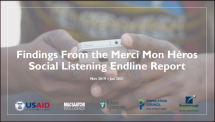Findings From the Merci Mon Héros Social Listening Endline Report
Breakthrough RESEARCH, in collaboration with resource partner M&C Saatchi, is using social listening as a research strategy to understand the types of health information shared through social media in Francophone West Africa.
Social listening is the process of tracking and analyzing conversation content and related metrics for a particular topic on social media. For social and behavior change programs, social listening can be an important tool for better understanding people’s beliefs, attitudes, and behaviors. Social listening research analyzes the content and sentiment behind messages—including misinformation—and uses that information to inform program design and adaptive management.
Findings from the Merci Mon Héros Social Listening Endline Report shares social listening findings from the youth-led Merci Mon Héros media campaign implemented by Breakthrough ACTION. This report is specific to conversations on menstruation and puberty in Côte d’Ivoire, Burkina Faso, Togo, and Niger, and investigates how these conversations have shifted.
For more information, contact Martha Silva, msilva-tulane@popcouncil.org
Source: Tulane University
Date of Publication: September 19, 2021
SIMILIAR RESOURCES
Tools
Examples
- Community Communication MNCH e-Manual: Participatory Health Promotion Sessions
- Informing Social and Behavior Change Programs using Social Listening and Social Monitoring
- HTSP Project Briefs: Niger, Togo
- “Because my Husband and I Have Never Had a Baby Before…” Results and Lessons from Interventions with First-Time Parents in Madagascar, Mozambique, and Nigeria
- Birth Spacing and Family Welfare Sermons
- How-To Guide for a Social Network Diffusion Intervention to Overcome Social Barriers to Family Planning
- Creating Mobile Health Solutions for Behaviour Change: A Study of Eight Services in the mNutrition Initiative Portfolio
- Using Media and Communication to Respond to Public Health Emergencies: Lessons Learned from Ebola
- How Should Community Health Workers in Fragile Contexts be Supported: Qualitative Evidence from Sierra Leone, Liberia and Democratic Republic of Congo
- Lever les Tabous: La sexualité et les approches promouvant l’égalité des genres pour mettre fin aux unions et aux mariages d’enfants, précoces et forcés
- Innovation Brief: Applying the Human-Centered Design Approach
- Women’s Social Networks, Family Planning Use and Unmet Need: Formative Research Findings from Terikunda Jékulu
- Malawi Moyo ndi Mpamba : Findings from the 2016 Endline Survey of 15 Districts
- Program Briefs: Changing Attitudes to Shift Contraceptive Demand
- Transform/PHARE activités brise-glace pour atelier de communication - Workshop Ice-breaker Activities

